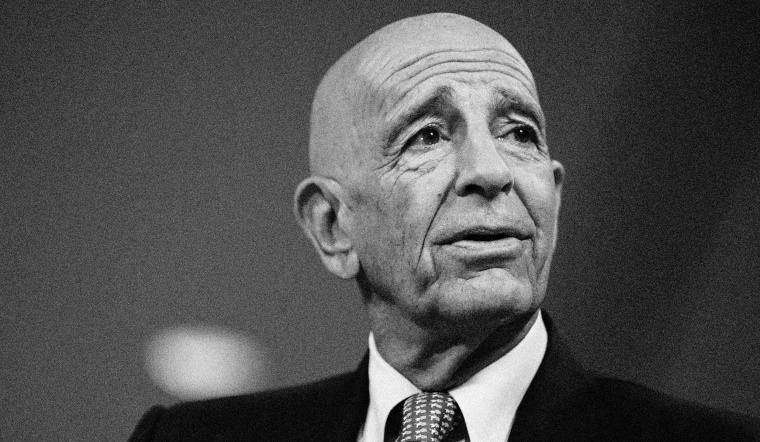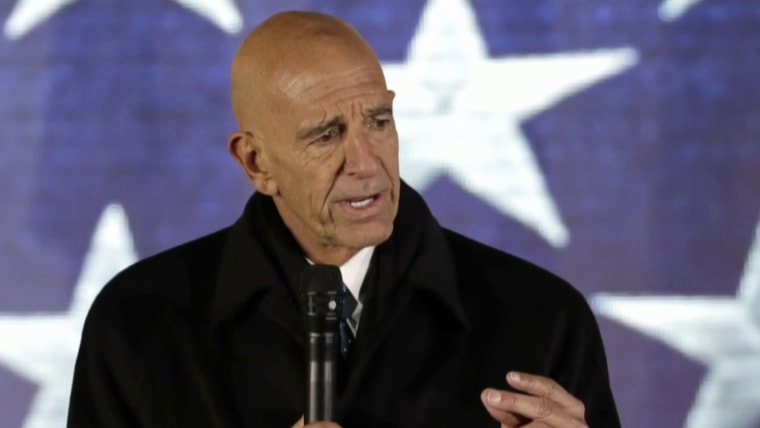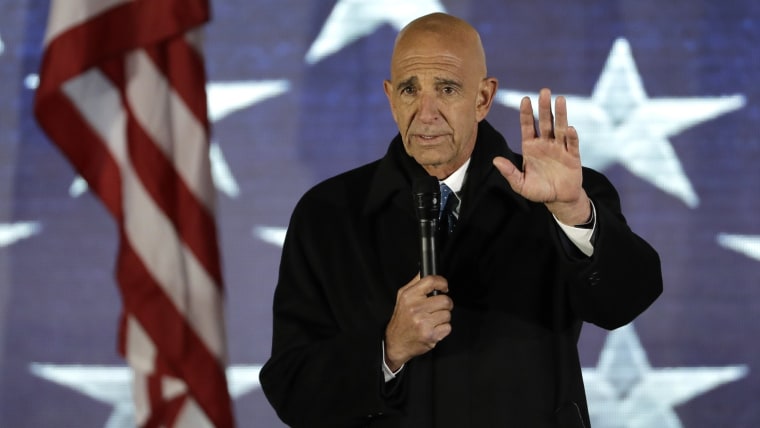An unregistered foreign agent told Trump 2016 campaign officials what to do — and they did it. When Donald Trump became president, the same foreign agent advised senior U.S. government officials on foreign policy — and they did what he wanted then, too.
Barrack knew precisely who he was answering to and where his allegiance rested.
Ultimately, that agent of a foreign power became the chairman of the 2017 Trump inauguration committee. He even sought out, albeit unsuccessfully, a more formal senior role in the Trump administration, including the job of special envoy to the Middle East, because that’s what foreign agents do: seek the most influential role they can find in order to serve their masters.
This is all according to the U.S. Department of Justice's announcement Tuesday of an indictment of Thomas Barrack, a wealthy close friend of Trump's, on charges of not disclosing that he was working for the United Arab Emirates to influence not only U.S. foreign policy but the Trump officials who seemed more than happy to be influenced. Two other men, Matthew Grimes and Rashid Sultan Rashid Al Malik Alshahhi, were also charged in the scheme.
Tom Barrack, Trump's inaugural committee chair, charged with acting as agent of UAE
JULY 21, 202109:11To be clear, this is not just a garden-variety Foreign Agents Registration Act case. Nor is it a scenario where someone forgot to file a small fee and some paperwork to advise the U.S. Department of Justice that they are lobbying on behalf of another country. It’s also not a case where a foreign agent thought he was just working for some private interests as an “independent intermediary.”
That’s what Barrack has already tried to claim (and a spokesperson said he will be pleading not guilty) and will want you to believe — but that would be contrary to all known facts. The specific charge against Barrack, Grimes and Alshahhi is 18 USC 951(a), which implies they were allegedly working directly with and for representatives of a foreign government. (According to Bess Levin of Vanity Fair, as of Tuesday, Grimes' attorney could not be reached for comment and Alshahhi was at large, the identity of his attorney unknown.)
While it’s often said that the cover-up is worse than the crime, it’s also true that a cover up can help prove the crime.
Here are the facts as set forth in the DOJ indictment, and here’s why we should all care.
First, Barrack seems to have been operating as a kind of double agent for the UAE. Mere lobbyists advocate for their clients, but they don’t collect sensitive nonpublic information from our government and pass it to another nation. The DOJ announcement said, “As alleged in the indictment, the defendants used Barrack’s status as a senior outside advisor to the campaign and, subsequently, to senior U.S. government officials, to advance the interests of and provide intelligence to the UAE while simultaneously failing to notify the Attorney General that their actions were taken at the direction of senior UAE officials.”
More specifically, the indictment alleges that “in May 2017, Barrack agreed to provide Alshahhi with non-public information about the views and reactions of senior U.S. government officials following a White House meeting between senior U.S. officials and senior UAE officials.”
Tom Barrack indictment adds new perspective on foreign schemes to help Trump win election
JULY 21, 202106:28Second, according to the indictment, Barrack was in frequent contact with UAE government officials. The indictment alleges “Barrack and Grimes also solicited direction from senior UAE officials in advance of the publication of an op-ed authored by Barrack and published in a national magazine in October 2016 and removed certain language at the direction of senior UAE officials, as relayed by Alshahhi.” Remember that when Barrack tries to assert that he had no idea who he was actually working for.
Because evidence indicates Barrack knew precisely who he was answering to and where his allegiance rested. The DOJ announcement said, “After one appearance in which Barrack repeatedly praised the United Arab Emirates, Barrack emailed Alshahhi, 'I nailed it. . . for the home team,' referring to the UAE.”
And when Barrack tries to claim that his endeavors were all on the up and up, ask him why, as detailed in the indictment, he had to use encrypted communications to mask his talks with the UAE government. “In furtherance of the alleged criminal conspiracy and conduct, Barrack and Grimes, with the assistance of Alshahhi, acquired a dedicated cellular telephone and installed a secure messaging application to facilitate Barrack’s communications with senior UAE officials,” the DOJ said.
It seems clearer with each new indictment of Trump cohorts that money and influence drove decision-making and access to power.
Third, don’t let anyone fool you that the clandestine influence work ended with the Trump campaign and never impacted decision-making after Trump was in power. As the DOJ explained, “Following the 2016 U.S. presidential election, the defendants repeatedly acted at the direction of UAE officials to influence the foreign policy positions of the incoming administration in favor of UAE interests.”
Fourth, Barrack allegedly lied to FBI agents in an attempt to obstruct their investigation of his work on behalf of the UAE. The indictment alleges that “On June 20, 2019, Barrack voluntarily met with FBI special agents. During the interview, Barrack allegedly made numerous false statements, including falsely denying that Alshahhi had ever requested that he take any actions on behalf of the UAE.”
More from MSNBC Daily
Must reads from Today's list
While it’s often said that the cover-up is worse than the crime, it’s also true that a cover-up can help prove the crime. In other words, if Barrack had no idea he was working for a foreign power to influence the U.S. president, and to pass government information to that foreign power, why would he lie about it? What is he covering up, and who is he covering for?
If all this talk of foreign agents and lying in and around the Trump White House sounds eerily familiar to you, that’s because we’ve seen this before. Former Trump national security adviser Michael Flynn admitted to lying about his work on behalf of the Turkish government, and Flynn pleaded guilty to lying to FBI agents about his talks with a Russian ambassador. Former Trump campaign chairman Paul Manafort was similarly convicted of violating the Foreign Agents Registration Act related to his work as an agent for Ukraine. As is alleged of Barrack and admitted to by Flynn, Manafort also lied to cover up his crimes.
It seems clearer with each new indictment of Trump cohorts that money and influence drove decision-making and access to power. That’s not particularly unusual in Washington circles. Yet, when so many foreign agents are so close to a president, and wield so much influence over our foreign policy positions, we have to wonder, as we have for the last several years: Was anyone in the Trump administration actually working on behalf of the American people?






